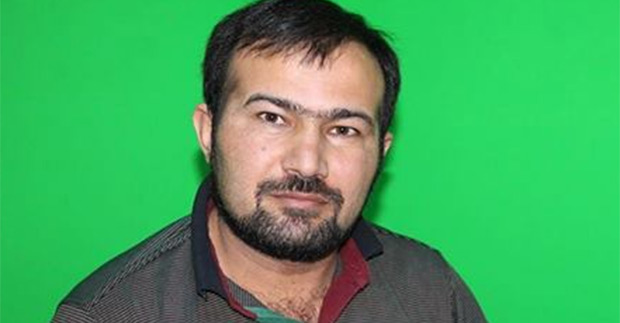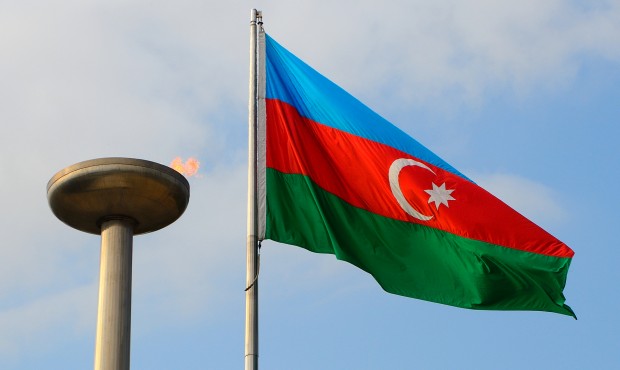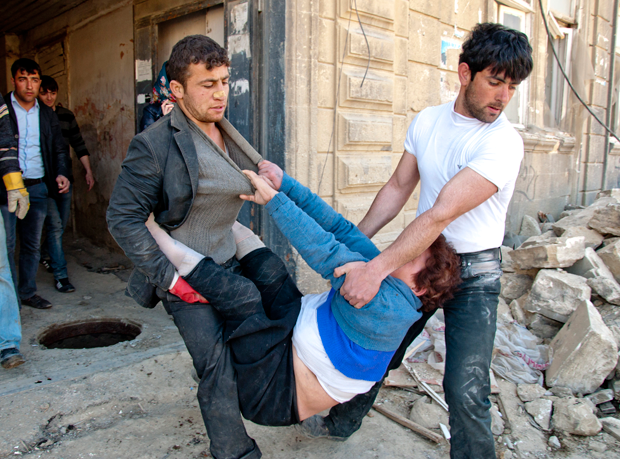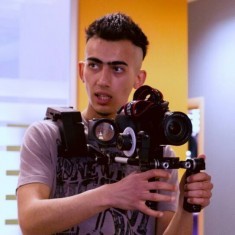Index relies entirely on the support of donors and readers to do its work.
Help us keep amplifying censored voices today.

Seymur Hezi was sentenced to five years in prison for “aggravated hooliganism” on 29 January 2015.
On the anniversary of Azerbaijani journalist Seymur Hezi’s sentencing to five years imprisonment for “aggravated hooliganism,” the country’s authorities have continued to target journalists, independent media and human rights activists.
Hezi, who contributed to the Index on Censorship Freedom of Expression Award-winning newspaper Azadliq, was sentenced on 29 January 2015. He was arrested on 29 August 2014 following an altercation in which the journalist was defending himself from a physical assault and harassment, according to his lawyers.
Rahim Haciyev, acting editor of Azadliq, told Index in September 2015 Hezi’s prosecution was due to his critical articles of the Azerbaijan authorities in the newspaper, as well as critiques he had made in his online TV programme, Azerbaijan Hour.
Haciyev said Hezi’s health is “very bad” due to the Azerbaijan’s awful prison conditions. Despite this, he said the journalist is working on articles about the country’s recent political history — some of which have been published in Azadliq.
In Hezi’s final statement given during his trial, he noted his belief in the shared struggle “with my dear friends at prison”. He also said: “It is not just a confrontation between the government and the opposition. It is the struggle between the good and the evil.”
After a year activism and journalism dedicated to free expression within the restricting country, not much positive change can be seen. Investigative journalist Khadija Ismayilova remains in jail, doing everything in her power to continue spreading the message of truth and resistance. Human rights lawyer Amal Clooney recently offered to take Ismayilova’s case to the European Court of Human Rights.
Azadliq, which was one of Azerbaijan’s only remaining independent news outlets operating inside the country, was forced to discontinue publishing a daily print edition of the newspaper in July 2014, due to its financial situation. The paper was hit with enormous fines following multiple defamation suits in 2013, and its journalists — including Hezi — have been targeted by authorities with politically motivated charges.
“The repression and detainment of journalists are continuing,” Haciyev said. “[The] government has started to arrest Facebook activists.”
Haciyev said that because the government cannot solve its country’s main problems, they try to create new problems for society through eliminating any chance of other opinions being promoted.

November is a month of historical anniversaries. Last Thursday was the annual commemoration of the foiling of the Gunpowder Plot and yesterday the UK fell silent to pay tribute to its war dead on Remembrance Sunday.
A much lesser-known date — at least to anyone outside Azerbaijan — is the country’s Flag Day, the celebration of the tricolour which was first adopted as the national flag on 9 November 1918.
The flag hoisted in the capital city of Baku was once confirmed by the Guinness Book of Records as being the tallest in the world. It flies on a pole 162 meters high and measures 70 by 35 meters. While the flag underwent a hiatus while Azerbaijan was part of the Soviet Union between 1920 and 1991, it is now a proud symbol of the country’s independence.
The tricolour consists of three horizontal stripes, each being deeply symbolic. The blue stripe stands for the Turkish origin of Azerbaijani people and the green stripe at the bottom expresses affiliation to Islam. Neither can be disputed. The red stripe in the middle, however, is problematic. It stands for progress, modernisation and democracy.
But Azerbaijan’s status as a modern democracy is less than convincing. Sure, the country has made some significant strides since the collapse of communism. It boasts a 98.8% literacy rate, and since the early 2000s spending on education has increased five-fold, for example.
However, there is an illusion of material progress in Azerbaijan. As Index on Censorship has been reporting, the country has experienced an unprecedented crackdown on human rights and freedoms.
Little over a week ago, Azerbaijan held a parliamentary election while an estimated 20 prisoners of conscience sat in prison. Azerbaijani journalist Khadija Ismayilova, who was sentenced to seven years and six months in jail in September for exposing state corruption, is one of them. The award-winning journalist was detained on 5 December 2014 and eventually convicted of libel, tax evasion and illegal business activity.
President Ilham Aliyev’s government has long claimed that “all freedoms are guaranteed in Azerbaijan“. Given his government’s lack tolerance for dissent, this clearly isn’t the case. Leyla Yunus, founder and director of the Institute for Peace and Democracy, and her husband, historian Arif Yunus — both outspoken critics of the government — have been detained since summer 2014 when they were arrested on charges of treason and fraud. On 13 August, the Baku Court on Grave Crimes sentenced Leyla to eight years and six months in prison and Arif to seven years in prison.
Democracy activist Rasul Jafarov, human rights lawyer Intigam Aliyev and journalist Seymur Hezi are also serving prison sentences on charges that were widely condemned for being politically motivated to silence outspoken critics of the government of President Aliyev.
The list of journalists and activists who have been arrested, abused, beaten and even killed goes on. In June 2015, on the eve of the inaugural European Games in Baku, activists from Amnesty International and Platform were banned from entering the country. Both organisations have been highly critical of Aliyev’s government, and its continuing targeting, jailing and prosecution dissenters. Even The Guardian was blocked from reporting on the games when its reporter was barred.
The ruling party in Azerbaijan may have won an outright majority in this month’s elections, cementing Aliyev’s hold on power. However, opposition parties boycotted the vote over concerns it was neither free nor fair. Even the Organization for Security and Cooperation in Europe (OSCE) refused to monitor the election after authorities severely limited its ability to observe the vote effectively. It marks the first time since 1991 that the OSCE has not monitored an Azerbaijani election and highlights that the situation in the country is far from progressive.
Flag Day is set against a backdrop of arrests and human rights abuses. If Azerbaijan is to earn its stripes, the authorities must uphold their human rights obligations, release all prisoners of conscience and allow for elections that meet basic democratic standards.
This article was posted on 9 November 2015 at indexoncensorship.org

Shamsi Badalbayli Street, Baku, 2 April 2012. A resident is forcibly evicted from the area where the Winter Garden will be constructed. Approximately 300 complaints have been sent to the European Court of Human Rights related to forced evictions from this area. This photograph by Ahmed Mukhtar appeared in the autumn 2013 issue of Index on Censorship magazine and was featured at a 2013 exhibition at the ICA.
Freelance journalist Ahmed Mukhtar, a contributor to Index on Censorship magazine, was detained at 7pm Friday 18 September in Azerbaijan, according to Contact.az.
Mukhtar’s brother, Elnur, works with Berlin-based Meydan.TV. His detention is the latest in a string of arrests of family members of contributors to Meydan.tv
“Ahmed Mukhtar is an extremely talented and courageous Azerbaijani photojournalist, whom I’ve had the pleasure of collaborating with through the Art for Democracy campaign. He is one of very few left in the country willing to capture risky subject matter like human rights abuses. His detention comes just one day after the detention of another young journalist, Abbas Shirin, also known for his photography, including his coverage of the recent trials of human rights defenders Leyla and Arif Yunus and journalist Khadija Ismayilova. Now it seems that even photographing people the Azerbaijani authorities have previously targeted is enough to land someone in jail”, said Rebecca Vincent, coordinator of the Sport for Rights campaign and former advocacy director of Art for Democracy, a creative campaign that ceased operations in August 2014 when authorities arrested its coordinator, human rights defender Rasul Jafarov.
Mukhtar was later released, according to a tweet from Vincent.
Update: #Azerbaijan photojournalist Ahmed Mukhtar has been released.
— Rebecca Vincent (@rebecca_vincent) September 18, 2015
Over the weekend, founder of Meydan.TV Emin Milli reported that three more journalists were detained and questioned before being released.
3 Journalists cooperating with @MeydanTV has been just detained in the airport + taken to police station #Azerbaijan pic.twitter.com/cDuZR7ZfM8
— Emin Milli (@eminmilli) September 19, 2015
On Thursday 17 September, Meydan.tv contributor Shirin Abbasov was sentenced to 30 days in jail “for disobeying the police after nearly thirty hours in custody,” according to Meydan.tv.
The Sport for Rights Coalition condemned Azerbaijan’s moves against journalists and independent media.
This article was updated on 21 September.

Shirin Abbasov (Photo: Meydan.tv)
The Sport for Rights Coalition condemns the Azerbaijani authorities’ extensive pressure against the staff of independent online television station Meydan TV, as part of a wider unprecedented crackdown on free expression and independent media. Following months of increased pressure in the aftermath of the European Games and the run-up to the 1 November parliamentary elections, on 17 September, Meydan TV reporter Shirin Abbasov was sentenced to 30 days of administrative detention for “disobeying police”. On 18 September, authorities searched the flat of another Meydan TV reporter, Javid Abdullayev, in connection with the case against Abbasov, seizing computers and cameras – indicating more serious charges might be forthcoming.
Abbasov, a 19 year-old freelance journalist and Meydan TV contributor, went missing on his way to university early the afternoon of 16 September, and his whereabouts were unknown for nearly 30 hours. Authorities eventually disclosed that Abbasov was being held at the Ministry of Internal Affairs’ notorious Department to Combat Organised Crime. Abbasov has so far been prevented from seeing his lawyer, who fears that Abbasov may be under pressure to sign a false confession.
“The arrest of Shirin Abbasov is yet another act by the authorities aimed at silencing independent voices in Azerbaijan”, said IMS Executive Director Jesper Højberg. “Locking up government critics and stepping up pressure on the country’s few remaining independent media outlets and NGOs has had disastrous consequences for Azerbaijan’s international relations, and certainly does not bode well for the upcoming parliamentary elections. The Azerbaijani government must take action now to put a stop to this downward spiral”.
Prior to his arrest, Abbasov was one of four Meydan TV staff prevented from leaving Azerbaijan after the conclusion of the European Games in June, told they were placed on a “blacklist” for unclear reasons. More recently, he covered the trials of human rights defenders Leyla and Arif Yunus, and journalist Khadija Ismayilova, capturing some of the only images of the political prisoners that were used in the press. Abbasov is also a popular video blogger, whose Facebook posts critical of the government have drawn widespread attention. He was one of six Meydan TV staff previously questioned over Meydan TV’s coverage of protests in the city of Mingechevir calling for the resignation of the local police chief following the 20 August death of a man in policy custody.
Also on 16 September, another young freelance journalist and Meydan TV contributor, Aytaj Ahmadova, was detained along with a friend and questioned for five hours by employees of the same Department to Combat Organised Crime, before being released. She reported that similarly to her colleagues, questions were focused on the Mingechevir protests, as well as Meydan TV’s activities, and its management and salary structure. Ahmadova’s parents have reportedly been fired from their jobs and threatened with arrest.
“The extensive questioning of Meydan TV’s staff in connection with the Mingechevir protests bears similar hallmarks to the cases built against journalist Tofig Yagublu and opposition leader Ilgar Mammadov – both of whom remain imprisoned on spurious charges connected with the 2013 protests in Ismayilli”, stated Thomas Hughes, ARTICLE 19’s Executive Director. “The Azerbaijani government should immediately cease its persecution of journalists working with Meydan TV, as well as any others legitimately expressing critical or independent viewpoints. Azerbaijan’s current actions, following a year of persistent crackdown down on freedom of expression, are in direct violation of its international obligations”.
In June, Meydan TV Director Emin Milli reported that he had received a threat from the Azerbaijani Minister of Youth and Sport, Azad Rahimov, in connection with Meydan TV’s critical reporting on the European Games. In July, 23 of his relatives signed a letter to Azerbaijani President Aliyev stating that they did not support Milli’s “anti-Azerbaijani policy” and had excluded him from the family for his “betrayal of Azerbaijan”. Meydan TV editor and popular writer Gunel Movlud also reported that her relatives have faced pressure in connection with her work; so far at least four have been fired from their jobs.
The growing pressure against the staff of Meydan TV takes place against a broader unprecedented crackdown on free expression and the independent media. In addition to Abbasov, there are eight journalists behind bars in Azerbaijan, as well as six human rights defenders who are strong free expression advocates, along with dozens of other political prisoners, many of whom were targeted for expressing critical opinions.
For more than a year, the staff of media freedom NGO the Institute for Reporters’ Freedom and Safety (IRFS) – where detained journalist Shirin Abbasov worked prior to Meydan TV – has faced tremendous pressure, culminating with the murder of IRFS Chairman Rasim Aliyev, who died in hospital on 9 August after being severely beaten the day before. The attack on Aliyev took place one year from the date authorities had raided and closed the office of IRFS and its online TV project, Obyektiv TV, which were forced to cease operations.
That same day, 8 August 2014, IRFS Director Emin Huseynov was forced into hiding, and was soon after granted refuge at the Swiss Embassy in Baku, where he remained for 10 months until he was finally allowed out of the country, but stripped of his Azerbaijani citizenship. Huseynov remains in exile abroad as a stateless person. His brother Mehman Huseynov, a well-known photojournalist and blogger, was detained earlier this month when he tried to obtain a replacement ID card as authorities had seized his in connection with a politically motivated criminal case against him from 2012. He has been prevented from leaving the country since June 2013. In January this year, IRFS deputy head Gunay Ismayilova was attacked outside her apartment in Baku.
Other independent media that have been facing extensive pressure include Radio Free Europe/Radio Liberty (RFE/RL)’s Baku bureau, which was raided and closed by authorities in December 2014, shortly after the arrest of its former bureau chief and prominent investigative journalist Khadija Ismayilova, who was sentenced on 1 September to 7.5 years in prison on spurious charges. Opposition Azadliq newspaper once again teeters on the brink of closure after years of excessive fines from defamation cases filed by public officials and their supporters, and other financial pressures. ‘Azerbaycan saati’ (Azerbaijan Hour), an opposition-minded online television station, has also faced extensive pressure, including the arrest of its presenter Seymur Hezi, who is currently serving a five-year prison sentence on spurious charges.
The Sport for Rights coalition condemns these acts aimed at silencing independent voices in Azerbaijan and punishing those who were critical in the run-up to the European Games. Sport for Rights believes that the pressure against Meydan TV is directly connected to its critical coverage of the European Games. Sport for Rights also notes that Meydan TV and the other organisations and individuals being targeted have all played an important role in exposing corruption and human rights abuses — which has become downright dangerous in Azerbaijan.
Sport for Rights calls for the immediate and unconditional release of Shirin Abbasov, as well as the other jailed journalists and human rights defenders in Azerbaijan. Sport for Rights also calls for the Azerbaijani authorities to put a stop to all acts of persecution of Meydan TV’s staff and other journalists and human rights defenders, and to take urgent steps to address the broader human rights crisis in the country ahead of the 1 November parliamentary elections.
Supporting organisations:
ARTICLE 19
Civil Rights Defenders
Committee to Protect Journalists
Human Rights House Foundation (HRHF)
Index on Censorship
International Federation for Human Rights (FIDH), in the framework of the
Observatory for the Protection of Human Rights Defenders
International Media Support (IMS)
International Partnership for Human Rights (IPHR)
Norwegian Helsinki Committee
PEN American Center
People in Need
Platform
Polish Green Network
World Organisation Against Torture (OMCT), in the framework of the
Observatory for the Protection of Human Rights Defenders
YouAid Foundation
[smartslider2 slider=”35″]